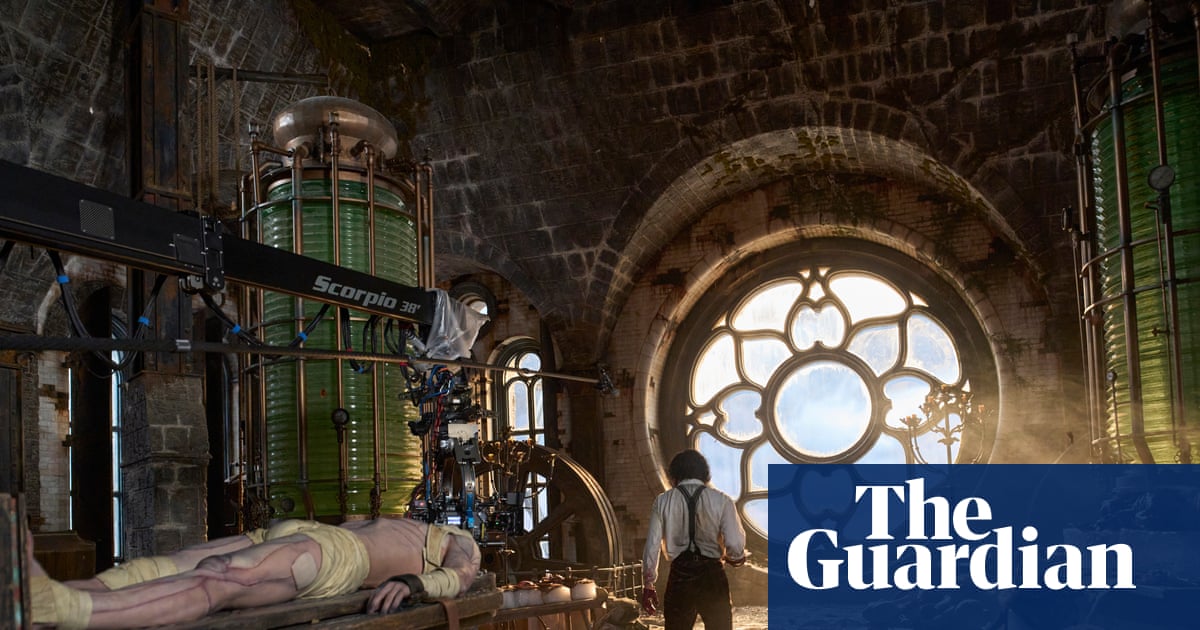When Guillermo del Toro accepted the Bafta for best director in 2018, he used his speech to pay homage to Mary Shelley, calling her “the most important figure from English legacy”.
“She picked up the plight of Caliban and she gave weight to the burden of Prometheus,” del Toro said. “She gave voice to the voiceless and presence to the invisible, and she showed me that sometimes to talk about monsters, we need to fabricate monsters of our own.”
Nearly two decades after first announcing his intention to adapt Shelley’s Frankenstein, the Mexican film-maker is finally unveiling his vision of the classic at the Venice film festival. Featuring Oscar Isaac as the obsessive scientist and Jacob Elordi as the monster, the film rekindles Shelley’s meditation on the fragile boundary between humanity and monstrosity. But its premiere comes in a year when Venice appears particularly fixated on monsters of every stripe.
Alberto Barbera, Venice’s artistic director, said the “fil rouge” of this year’s event was monsters, from del Toro’s fantastical creature to the “real monsters” of the last century. “We have films about dictators of the past and present, from Mussolini and Ceaușescu, to Gaddafi and Putin,” he told the Guardian. “There are films about the monstrosity of war in Ukraine and Gaza; the monstrosity of crimes committed by normal people; and the menace of the atomic bomb, which is a real fear.”
The lineup includes Olivier Assayas’ political thriller The Wizard of the Kremlin, which traces Vladimir Putin’s rise to power and stars Jude Law as the future president and Paul Dano as his spin doctor.
Jihan K’s documentary My Father and Qaddafi examines the disappearance in Cairo in 1993 of her father, Mansur Rashid Kikhia, the peaceful opposition leader to the Libyan dictator. Mihai Mincan’s Milk Teeth, set in the final days of Nicolae Ceaușescu’s dictatorship, follows a young girl who becomes the last witness to her sister’s mysterious disappearance in a small Romanian town, while Pietro Marcello’s Duse is a portrait of the artist Eleonora Duse set against the backdrop of rising fascism in Mussolini’s Italy.
The preoccupation with monsters is not accidental, according to Natalie Lawrence, the author of Enchanted Creatures: Our Monsters and Their Meanings. “We’ve always been fascinated and repelled by the monsters like Frankenstein, because they always speak to something in us we’re struggling with deep down,” she said.
“Not all monsters are bad, of course. But monsters have always been the corporeal forms for society’s concerns. Terrible humans become the monster of historical events, or fictional beasts are created from mythic anxieties. So you have a spectrum: from the real, genocidal dictators of recent times, made monstrous, all the way to the ancient moloch monster-deities of death.”
That fascination extends to war and nuclear dread. Kathryn Bigelow’s A House of Dynamite, starring Idris Elba and Rebecca Ferguson, follows White House officials confronting the threat of a missile attack on the US. “Multiple nations possess enough nuclear weapons to end civilization within minutes,” Bigelow said. “And yet there’s a kind of collective numbness – a quiet normalisation of the unthinkable”.
Kaouther Ben Hania’s The Voice of Hind Rajab tells the story of a five-year-old Palestinian girl killed in January 2024 when her family’s vehicle was shelled by Israeli forces. The film incorporates harrowing recordings of a final phone call between the girl and rescue services.
And the Ukrainian producer Alexander Rodnyansky, sentenced in absentia to 8.5 years in prison by a Russian court for his anti-war stance, will premiere his documentary Notes of a True Criminal, reflecting on Ukraine’s turbulent history and its personal toll.
“We are living in really dangerous times,” Barbera said. “I’m part of the post-World War II generation that believed peace was permanent. But the world we knew is collapsing. We are dealing with wars in every corner, and the threat of nuclear weapons. Film-makers are responding with a return to a cinema of reality. They don’t always provide answers, but they always ask questions.”
Barbera said he expected this year’s festival might also be marked by political demonstration. “But the films themselves already speak to the problems of the contemporary world. Venice is not a closed space; it is a space for confrontation.”
A pro-Palestinian protest is expected to take place at the festival on 30 August, while the group Venice4Palestine called on the Biennale to withdraw invites to Gerard Butler and Gal Gadot, who star in Julian Schnabel’s In The Hand of Dante alongside Oscar Isaac, Al Pacino, and Martin Scorsese, and have supported Israel in the past.
A total of 21 films will compete for this year’s Golden Lion, with a jury led by Alexander Payne, the director of The Holdovers. Among the most anticipated in competition are Yorgos Lanthimos’s Bugonia, starring Emma Stone; Noah Baumbach’s ensemble comedy Jay Kelly, featuring George Clooney, Adam Sandler, Laura Dern and Greta Gerwig; and Benny Safdie’s The Smashing Machine, with Dwayne Johnson and Emily Blunt.
Jim Jarmusch’s anthology Father Mother Sister Brother, with Adam Driver, Cate Blanchett, Charlotte Rampling, Vicky Krieps and Tom Waits, and Park Chan-wook’s No Other Choice, starring Lee Byung-hun, are also in competition.
Beyond the competition, the festival will feature Luca Guadagnino’s After the Hunt, with Julia Roberts, Andrew Garfield and Chloë Sevigny, and Werner Herzog’s new documentary Ghost Elephants. Herzog will also receive a Golden Lion for lifetime achievement, alongside Kim Novak, a Hollywood star of the 1950s who appeared in Alfred Hitchcock’s Vertigo.
